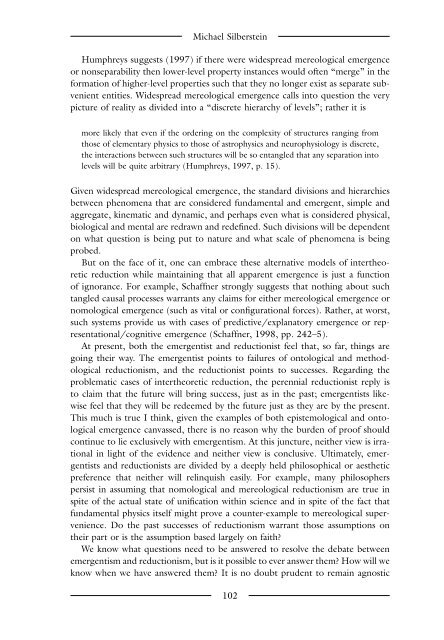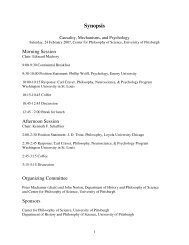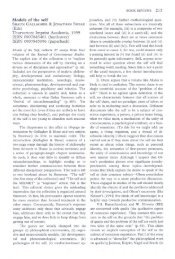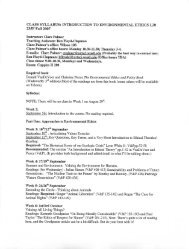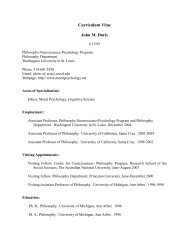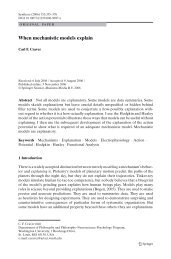The Blackwell Guide to the Philosophy of Science - The Department ...
The Blackwell Guide to the Philosophy of Science - The Department ...
The Blackwell Guide to the Philosophy of Science - The Department ...
You also want an ePaper? Increase the reach of your titles
YUMPU automatically turns print PDFs into web optimized ePapers that Google loves.
Michael Silberstein<br />
Humphreys suggests (1997) if <strong>the</strong>re were widespread mereological emergence<br />
or nonseparability <strong>the</strong>n lower-level property instances would <strong>of</strong>ten “merge” in <strong>the</strong><br />
formation <strong>of</strong> higher-level properties such that <strong>the</strong>y no longer exist as separate subvenient<br />
entities. Widespread mereological emergence calls in<strong>to</strong> question <strong>the</strong> very<br />
picture <strong>of</strong> reality as divided in<strong>to</strong> a “discrete hierarchy <strong>of</strong> levels”; ra<strong>the</strong>r it is<br />
more likely that even if <strong>the</strong> ordering on <strong>the</strong> complexity <strong>of</strong> structures ranging from<br />
those <strong>of</strong> elementary physics <strong>to</strong> those <strong>of</strong> astrophysics and neurophysiology is discrete,<br />
<strong>the</strong> interactions between such structures will be so entangled that any separation in<strong>to</strong><br />
levels will be quite arbitrary (Humphreys, 1997, p. 15).<br />
Given widespread mereological emergence, <strong>the</strong> standard divisions and hierarchies<br />
between phenomena that are considered fundamental and emergent, simple and<br />
aggregate, kinematic and dynamic, and perhaps even what is considered physical,<br />
biological and mental are redrawn and redefined. Such divisions will be dependent<br />
on what question is being put <strong>to</strong> nature and what scale <strong>of</strong> phenomena is being<br />
probed.<br />
But on <strong>the</strong> face <strong>of</strong> it, one can embrace <strong>the</strong>se alternative models <strong>of</strong> inter<strong>the</strong>oretic<br />
reduction while maintaining that all apparent emergence is just a function<br />
<strong>of</strong> ignorance. For example, Schaffner strongly suggests that nothing about such<br />
tangled causal processes warrants any claims for ei<strong>the</strong>r mereological emergence or<br />
nomological emergence (such as vital or configurational forces). Ra<strong>the</strong>r, at worst,<br />
such systems provide us with cases <strong>of</strong> predictive/explana<strong>to</strong>ry emergence or representational/cognitive<br />
emergence (Schaffner, 1998, pp. 242–5).<br />
At present, both <strong>the</strong> emergentist and reductionist feel that, so far, things are<br />
going <strong>the</strong>ir way. <strong>The</strong> emergentist points <strong>to</strong> failures <strong>of</strong> on<strong>to</strong>logical and methodological<br />
reductionism, and <strong>the</strong> reductionist points <strong>to</strong> successes. Regarding <strong>the</strong><br />
problematic cases <strong>of</strong> inter<strong>the</strong>oretic reduction, <strong>the</strong> perennial reductionist reply is<br />
<strong>to</strong> claim that <strong>the</strong> future will bring success, just as in <strong>the</strong> past; emergentists likewise<br />
feel that <strong>the</strong>y will be redeemed by <strong>the</strong> future just as <strong>the</strong>y are by <strong>the</strong> present.<br />
This much is true I think, given <strong>the</strong> examples <strong>of</strong> both epistemological and on<strong>to</strong>logical<br />
emergence canvassed, <strong>the</strong>re is no reason why <strong>the</strong> burden <strong>of</strong> pro<strong>of</strong> should<br />
continue <strong>to</strong> lie exclusively with emergentism. At this juncture, nei<strong>the</strong>r view is irrational<br />
in light <strong>of</strong> <strong>the</strong> evidence and nei<strong>the</strong>r view is conclusive. Ultimately, emergentists<br />
and reductionists are divided by a deeply held philosophical or aes<strong>the</strong>tic<br />
preference that nei<strong>the</strong>r will relinquish easily. For example, many philosophers<br />
persist in assuming that nomological and mereological reductionism are true in<br />
spite <strong>of</strong> <strong>the</strong> actual state <strong>of</strong> unification within science and in spite <strong>of</strong> <strong>the</strong> fact that<br />
fundamental physics itself might prove a counter-example <strong>to</strong> mereological supervenience.<br />
Do <strong>the</strong> past successes <strong>of</strong> reductionism warrant those assumptions on<br />
<strong>the</strong>ir part or is <strong>the</strong> assumption based largely on faith?<br />
We know what questions need <strong>to</strong> be answered <strong>to</strong> resolve <strong>the</strong> debate between<br />
emergentism and reductionism, but is it possible <strong>to</strong> ever answer <strong>the</strong>m? How will we<br />
know when we have answered <strong>the</strong>m? It is no doubt prudent <strong>to</strong> remain agnostic<br />
102


